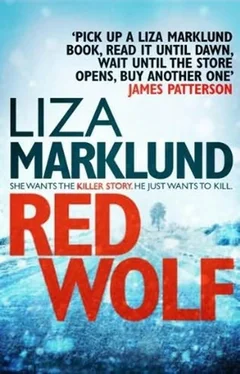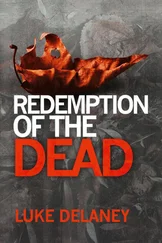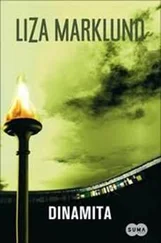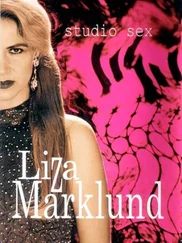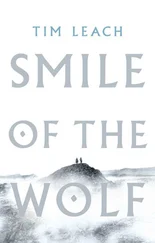‘And?’ Annika said.
‘Another Mao quote. Why have you written them down?’
Annika had to sit down.
‘They’re letters,’ she said. ‘Anonymous letters to murder victims. The destruction one was sent to Benny Ekland’s workplace a couple of days after the first murder, the peasants’ movement was sent to a local councillor in Östhammar the day after his presumed suicide.’
Berit sat down on Annika’s desk, her face pale. ‘What the…?’
Anna shook her head, pressing her hands to her forehead. ‘I have to speak to Linus Gustafsson’s mother,’ she said.
The phone rang out into the echoing, frozen space a thousand kilometres north. Her hand was sweating as she pressed the phone to her ear.
‘Should I go?’ Berit mouthed, pointing first at herself, then at the sliding door.
Annika shook her head, closed her eyes.
In the middle of a ring the phone was picked up. The voice that answered sounded newly woken, confused.
‘My name’s Annika Bengtzon, I’m calling from the Evening Post in Stockholm,’ Annika said in the slow, clear tone of voice she had learned to use in her years as a night editor, the shift when most phone calls reached people who were fast asleep.
‘Who?’ the woman on the phone said.
‘I wrote about Linus in the paper,’ Annika said, suddenly feeling tears welling up. ‘I just wanted to call to say how very sorry I am.’
Suddenly the boy was in front of her, his spiked hair and watchful eyes, his defensive body language and uncertain voice; she couldn’t help a sudden and audible sob.
‘Sorry,’ she said, ‘I-’ She put her hand over her mouth to cover her sobs, ashamed that Berit, who was now sitting down in one of the chairs, should see her like this.
‘It wasn’t your fault,’ the woman said, still sounding sleepy.
‘Are you his mum?’
‘I’m Viveka.’ She pronounced it unusually.
‘I feel horribly guilty,’ Annika said, realizing that the phone call wasn’t turning out as she had imagined. ‘I shouldn’t have written about Linus.’
‘We’ll never know,’ the woman said flatly. ‘But I thought it was a good thing that you got it out of him. I couldn’t work out what was wrong with him. He was a different person after it happened, and he refused to tell me what it was.’
‘Well,’ Annika said, ‘but what if-’
The woman interrupted her, rather sharply. ‘Do you believe in God, Annika Bengtzon?’
Annika hesitated as the tears dried up. ‘Not really,’ she managed to say.
‘Well, I do,’ the woman said slowly, and with slightly forced emphasis. ‘It’s helped me through many trials over the years. The Lord called Linus to Him; I don’t understand why, but I accept it.’
Sorrow travelled like an ice-cold wind down the phone line from Luleå, making Annika shiver. The destructive power of human loss, where God’s love might provide the flickering flame that prevented the definitive final chill.
‘My grandmother died,’ Annika said. ‘Seven years ago. I think of her every day. I can’t even begin to imagine your loss.’
‘I have to continue my time on earth without Linus,’ his mother said, ‘even if I can’t see right now how I’m going to manage. But I’m firm in my faith that God the Father is doing what is best for me, that His hand rests above me.’
The woman fell silent, Annika could hear her weeping. She waited, not sure if she should try to end the conversation and hang up.
‘In time I may come to understand why,’ the woman went on suddenly, in a clear, lucid voice. ‘And I shall meet Linus again, of course, in the House of Our Lord. I know this to be true. It gives me the strength to carry on living.’
‘I wish I had your God,’ Annika said.
‘He is there for you, too,’ the woman said. ‘He is there, if only you want to take Him to you.’
The silence that followed could have been difficult, but to her surprise Annika found it warm.
‘There was something else I wanted to ask,’ she said. ‘Have you had anything strange in the post since Linus died?’
Viveka Gustafsson thought for a few seconds before she replied. ‘You mean that thing about youth?’
Annika looked over at Berit.
‘Youth?’
‘An anonymous letter arrived, no signature or anything; I thought it was a note of sympathy from one of the neighbours who didn’t want to disturb me by knocking.’
‘Have you still got it?’
The woman let out a deep sigh that stemmed from the hopelessness of having to do anything connected with the living, the sort of daily routines that had brought light and united her with the rest of the world for decades but had now suddenly lost all meaning.
‘I think I put it in the pile with the newspapers, hang on, I’ll go and get it…’
A sharp noise hit Annika’s ear as the other phone was put down on a wooden table somewhere in Svartöstaden. There was the sound of rustling on the line, of footsteps coming and going.
‘Sorry to take so long,’ the woman said tiredly. ‘I’ve got it. It says: How should we judge whether a youth is revolutionary? How to discern this? There is only one criterion: if he is disposed to stand, and stands in practice, with the great worker and peasant masses. He is revolutionary if he wants to do so and does it; otherwise he is non-revolutionary or counter-revolutionary .’
Annika stared wide-eyed at Berit and grabbed a pen.
‘Can you repeat that slowly, please? I’d like to write it down. “How should we judge whether a youth is revolutionary?”’
‘ How to discern this? There is only one criterion: if he is disposed to stand, and stands in practice, with the great worker and peasant masses. He is revolutionary if he wants to do so and does it; otherwise he is non-revolutionary or counter-revolutionary .’
‘“How to discern this? There is only one criterion…”’
Berit nodded, mouthed ‘Mao’.
Viveka Gustafsson continued reading down the line. ‘… if he is disposed to stand, and stands in practice, with the great worker and peasant masses. He is revolutionary if he wants to do so and does it; otherwise he is non-revolutionary or counter-revolutionary .’
‘Have you mentioned this to the police?’
‘No,’ the woman said, and for the first time life filtered in, a surprise which one day would lead to curiosity, and finally to actual joy in being alive. ‘Should I have done?’
‘What does the letter look like?’
‘Well,’ the woman said, ‘what can I say? It looks like an ordinary sheet torn out of a pad.’
‘A4? Lined?’
‘Blue lines. Is that important?’
‘Have you still got the envelope?’
‘Yes, it’s here.’
‘What does it look like?’
‘Look like? An ordinary little white envelope, like when you fold a sheet of paper in four. Addressed to us, the Gustafsson family. Normal stamp, postmark… what does it say? Luleå, but I can’t see the date.’
‘What sort of stamp?’
A few seconds’ silence.
‘Someone playing hockey.’
Annika screwed her eyes tight shut, forcing her pulse to slow down.
‘I think you should call the police and tell them that you’ve received this letter. I might mention in the newspaper the fact that you got it, is that okay with you?’
The woman’s surprise had turned to confusion. ‘But why would you do that?’
Annika hesitated, unable to be entirely honest with Viveka Gustafsson.
‘I don’t really know if it means anything or not,’ she said. ‘It would be wrong of me to speculate about something I don’t know.’
The woman reflected on this, and it sounded almost as if she was nodding.
‘When you don’t know, you shouldn’t say,’ she said. ‘I’ll speak to the inspector.’
Читать дальше
